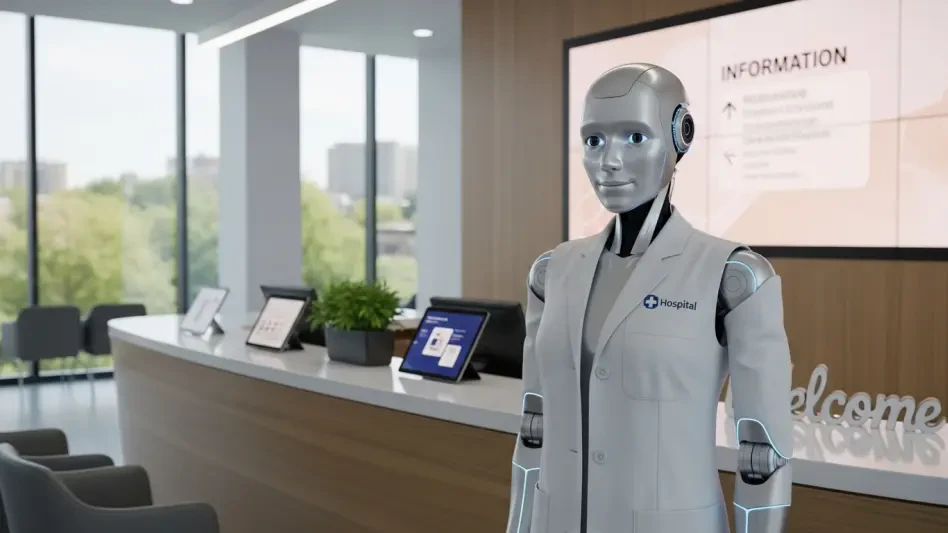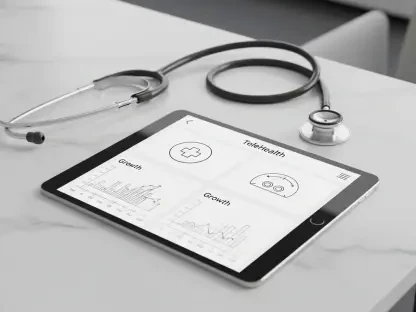The National Health Service (NHS) stands at a critical juncture, grappling with mounting pressures to deliver high-quality care amid constrained budgets and growing demand, while a staggering statistic reveals the scale of the challenge. Over 10 million emails are exchanged monthly within the NHS, alongside more than a million online meetings, often bogging down staff with administrative tasks. Enter artificial intelligence (AI), a transformative force poised to alleviate these burdens, as demonstrated by a landmark trial involving over 30,000 workers across 90 organizations. This report delves into how AI, through tools like Microsoft 365 Copilot, is driving unprecedented time and cost savings, reshaping healthcare delivery in the process.
The Current Landscape of AI in the NHS
AI integration within the NHS has gained significant momentum, marking a pivotal shift in how healthcare services are delivered. As of now, the technology is being embedded into routine operations to streamline administrative functions and enhance clinical support. This adoption reflects a broader push for digital transformation, addressing long-standing inefficiencies that have plagued the system for decades. The focus is on leveraging AI to optimize workflows, allowing staff to prioritize patient care over paperwork.
A major player in this space is Microsoft, whose tool, Microsoft 365 Copilot, has been trialed across a vast network of NHS organizations. With over 30,000 workers from 90 entities participating, the scale of involvement underscores the NHS’s commitment to testing cutting-edge solutions. This strategic partnership has enabled over 50,000 staff to access AI capabilities at no additional cost, integrating seamlessly into everyday platforms like Teams, Outlook, and Word. The initiative highlights how collective purchasing power can secure innovative tools for widespread use.
The significance of AI extends beyond mere implementation; it represents a cornerstone of the NHS’s vision for modernization. By tackling inefficiencies head-on, such as excessive time spent on documentation, the technology aligns with overarching goals to create a more responsive health system. This digital shift is not just about adopting new tools but about fundamentally rethinking how healthcare operates in an era of constrained resources and rising patient expectations.
Impact and Benefits of AI in NHS Operations
Key Findings from the Microsoft 365 Copilot Trial
The trial of Microsoft 365 Copilot has yielded remarkable results, showcasing AI’s potential to transform daily operations within the NHS. Staff members, on average, saved 43 minutes per day, which equates to roughly five weeks of time annually per individual. Such savings are monumental when considering the cumulative impact across thousands of workers, offering a glimpse into the efficiency gains possible with broader implementation.
Drilling into specific metrics, the trial revealed monthly savings of 83,333 hours by automating note-taking during over a million Teams meetings held each month. Additionally, summarizing complex email chains—amid the 10.3 million emails sent monthly—saved an impressive 271,000 hours. These figures illustrate how AI targets time-intensive tasks, freeing up personnel for more critical, patient-facing responsibilities. A full rollout could amplify these benefits, potentially saving up to 400,000 hours monthly across the system.
Scaling these outcomes across the entire NHS promises a paradigm shift in operational capacity. The trial’s success suggests that embedding AI into routine processes could redefine productivity standards, setting a precedent for other healthcare systems globally. The data points to a future where administrative burdens are significantly reduced, allowing the workforce to focus on what truly matters—delivering care.
Financial Savings and Productivity Gains
Beyond time efficiencies, the financial implications of AI adoption are profound. With 100,000 users, the NHS estimates monthly savings in the millions of pounds, potentially scaling to hundreds of millions annually. These figures represent a substantial opportunity to redirect funds into critical areas like patient services, infrastructure upgrades, or staff recruitment, addressing some of the most pressing needs within the system.
Productivity metrics further underscore AI’s impact, with acute trusts reporting a 2.7% increase in efficiency over a recent 12-month period, surpassing the government’s 2% target. This achievement highlights how digital tools contribute to meeting and exceeding strategic objectives, paving the way for sustained improvements. AI’s role in driving these gains positions it as a key enabler of long-term fiscal health for the NHS.
Looking ahead, the reinvestment of these savings holds transformative potential. Funds liberated by AI efficiencies could bolster frontline care, reduce waiting times, or enhance training programs for staff. This forward-thinking approach ensures that financial benefits translate into tangible improvements for patients, reinforcing the case for widespread adoption of such technologies across the health service.
Challenges in Implementing AI Across the NHS
Implementing AI on a large scale within the NHS is not without hurdles, particularly when integrating with legacy systems. Many existing infrastructures are outdated, rooted in analog processes that resist seamless adoption of digital tools. This technological mismatch poses a significant barrier, requiring substantial updates to ensure compatibility and functionality across diverse settings.
Staff training and cultural resistance also present notable challenges. Transitioning to AI-driven workflows demands comprehensive education to equip personnel with necessary skills, a process that can be time-consuming and resource-intensive. Additionally, skepticism or reluctance among some employees, accustomed to traditional methods, may slow progress, necessitating targeted change management strategies to foster acceptance and enthusiasm.
To address these obstacles, a phased rollout approach could prove effective, allowing gradual adaptation and troubleshooting. Enhanced training programs, tailored to different roles within the NHS, alongside continuous feedback mechanisms, can help mitigate resistance and build confidence in AI tools. Ensuring equitable access across varied organizations is equally critical, requiring strategic planning to prevent disparities in implementation and benefits.
Regulatory and Ethical Considerations for AI in Healthcare
Navigating the regulatory landscape is essential for AI deployment in the NHS, where strict data privacy laws and patient confidentiality standards govern operations. Compliance with UK healthcare policies ensures that tools like Microsoft 365 Copilot adhere to rigorous guidelines, safeguarding sensitive information. This framework is vital for maintaining public trust in digital innovations within a highly personal sector like healthcare.
Security measures are paramount, especially given the volume of health data processed daily. Robust encryption and access controls embedded in AI platforms protect against breaches, a non-negotiable aspect of their integration. Regular audits and updates to these protocols are necessary to address evolving cyber threats, ensuring that patient and staff data remain secure at all times.
Ethical considerations also play a central role, particularly around transparency in AI decision-making processes. Clear communication about how algorithms function and influence outcomes fosters trust among NHS staff and patients alike. Balancing innovation with accountability ensures that ethical standards keep pace with technological advancements, supporting sustainable adoption across the system.
The Future of AI in NHS Transformation
Looking toward the horizon, AI holds immense potential to reshape NHS operations beyond current trials. Emerging tools and innovations, from predictive analytics for patient outcomes to automated scheduling systems, promise to further enhance efficiency. These advancements could redefine care delivery, making services more proactive and personalized to individual needs.
Alignment with the government’s 10-Year Health Plan is a key driver, as AI supports reforms in elective care, outpatient services, and emergency response. By integrating technology into these areas, the NHS can address systemic bottlenecks, such as long waiting lists, while improving resource allocation. This synergy between policy and innovation lays a foundation for enduring improvements in healthcare access and quality.
External factors, including technological progress, funding availability, and shifting patient expectations, will shape AI’s trajectory within the NHS. Sustained investment and collaboration with industry leaders like Microsoft will be crucial to maintain momentum. As demand for efficient, responsive care grows, AI stands poised to meet these challenges, driving a future where technology and human expertise converge for optimal outcomes.
AI as a Catalyst for NHS Modernization
Reflecting on the journey, the Microsoft 365 Copilot trial marked a turning point for the NHS, demonstrating AI’s capacity to slash administrative workloads and unlock significant cost savings. The quantifiable gains in time and productivity have already begun to shift focus back to patient care, while financial benefits offer a pathway to reinvest in critical services. This initiative lays a strong foundation for systemic change within a resource-strained environment.
Moving forward, actionable steps include accelerating broader adoption through targeted investments in digital infrastructure and training. Collaborations with technology partners need to deepen, ensuring scalable, cost-effective solutions reach every corner of the NHS. Addressing disparities in access and capability across organizations emerges as a priority to maximize impact.
Ultimately, the experience underscores that strategic partnerships and innovation hold the key to a more efficient, patient-centered health system. Future considerations center on sustaining this momentum by anticipating technological trends and adapting to evolving care demands. The path ahead promises a reimagined NHS, where AI serves as an enduring ally in meeting the challenges of modern healthcare delivery.









